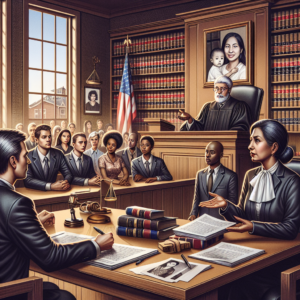Unmasking the Truth: The Alarming Rise of Age Verification Regulations
[caption id="attachment_32674" align="alignnone" width="630"] Family Law[/caption]
In recent years, the digital landscape has witnessed a significant shift towards the implementation of age verification regulations aimed at protecting minors from harmful online content. As governments and regulatory bodies around the world grapple with the challenges posed by unrestricted access to the internet, the rise of these regulations has sparked a heated debate about privacy, user experience, and the ethical implications of such measures. This article delves into the complexities of age verification regulations, examining their legal landscape, impact on online privacy, industry responses, ethical considerations, and future implications for digital rights.
Understanding Age Verification Regulations: A Growing Global Concern
Age verification regulations are designed to ensure that individuals accessing certain online content, particularly adult-oriented material, are of legal age. The growing concern over the exposure of minors to inappropriate content has prompted governments to take action, leading to a surge in proposed and enacted legislation worldwide. These regulations often require websites to implement systems that verify the age of users before granting access to specific content. While the intent behind these regulations is to protect children, they raise significant questions about the effectiveness of such measures and the potential for overreach in the digital space.
The Legal Landscape: Recent Developments in Age Verification Laws Worldwide
The legal landscape surrounding age verification is rapidly evolving, with various countries introducing or considering new laws. In the United States, several states have enacted or proposed legislation requiring age verification for adult websites, while the UK has implemented the Digital Economy Act, mandating age checks for online pornography. Meanwhile, countries like Australia and Canada are exploring similar regulations. These developments reflect a growing consensus among lawmakers that stricter measures are necessary to safeguard minors online. However, the patchwork nature of these laws poses challenges for international compliance and raises concerns about the potential for conflicting regulations across borders.
The Impact of Age Verification on Online Privacy and User Experience
The implementation of age verification systems has significant implications for online privacy and user experience. Many age verification methods require users to provide personal information, such as identification documents or credit card details, raising concerns about data security and the potential for misuse of sensitive information. Additionally, the user experience may be compromised as individuals face barriers to accessing content they are legally entitled to view. Critics argue that these measures can lead to a chilling effect, where users may avoid certain websites altogether due to privacy concerns or cumbersome verification processes, ultimately limiting access to information and resources.
Industry Responses: How Businesses Are Adapting to New Age Verification Requirements
In response to the increasing demand for age verification, businesses are exploring various solutions to comply with regulations while maintaining user trust. Some companies are investing in advanced technologies, such as artificial intelligence and biometric verification, to streamline the age verification process and enhance security. Others are opting for third-party verification services that can authenticate users without storing personal data. However, the implementation of these systems often comes with significant costs and logistical challenges, particularly for smaller businesses that may struggle to meet compliance requirements. As the regulatory landscape continues to evolve, businesses must remain agile and proactive in adapting to these changes.
The Ethical Debate: Balancing Protection and Personal Freedom in Age Verification
The rise of age verification regulations has ignited an ethical debate about the balance between protecting minors and preserving personal freedoms. Proponents argue that these measures are essential for safeguarding children from harmful content, while opponents contend that they infringe on individual privacy rights and can lead to unnecessary surveillance. The ethical implications of age verification extend beyond privacy concerns, as they also touch upon issues of censorship and the potential for discrimination against certain groups. As society grapples with these complex issues, it is crucial to consider the broader implications of age verification on civil liberties and the fundamental right to access information.
Future Implications: What the Rise of Age Verification Means for Digital Rights
The increasing prevalence of age verification regulations raises important questions about the future of digital rights. As governments continue to prioritize the protection of minors, there is a risk that privacy rights and freedoms could be compromised in the process. The potential for a surveillance state looms large, with age verification systems serving as a gateway for broader monitoring of online activities. Moreover, the digital divide may widen as marginalized communities face greater barriers to accessing online content. As stakeholders navigate this evolving landscape, it is imperative to advocate for a balanced approach that prioritizes both the protection of minors and the preservation of digital rights for all users.
The alarming rise of age verification regulations represents a critical juncture in the ongoing discourse surrounding online safety, privacy, and digital rights. While the intent behind these regulations is to protect vulnerable populations, the implications for user experience, privacy, and ethical considerations cannot be overlooked. As the legal landscape continues to evolve, it is essential for policymakers, businesses, and advocates to engage in meaningful dialogue to ensure that the rights of all individuals are respected in the digital age. The challenge lies in finding a way to protect minors without sacrificing the fundamental freedoms that underpin the internet as a platform for information and expression.
